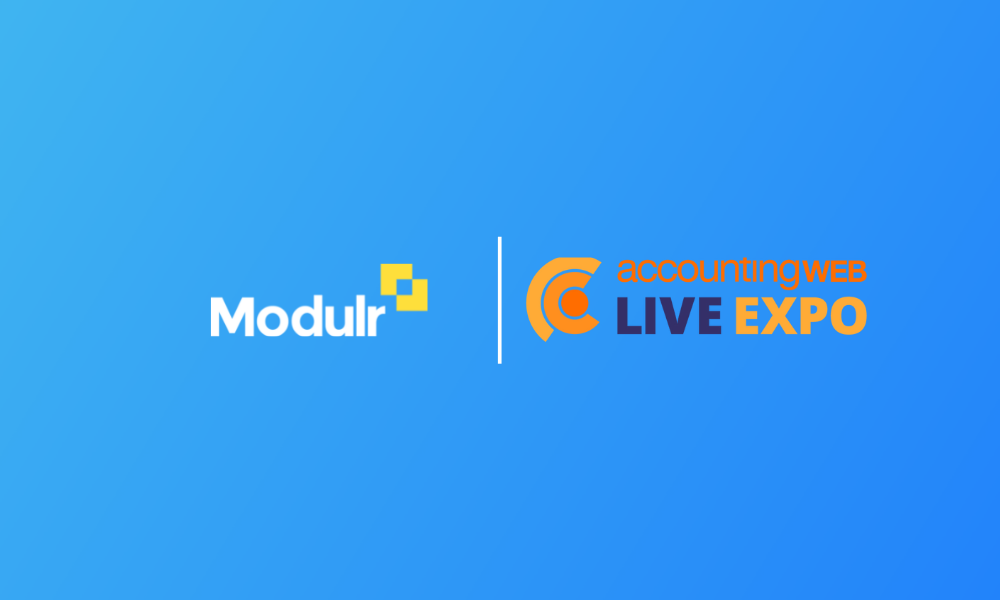Leading accounting website, AccountingWEB, put on their first-ever Live Expo at the Coventry Building Society Arena on the 1-2 December.
Modulr was there as an exhibitor, but we were also very much in listening mode, particularly concerning tech trends. We wanted to better understand how Modulr fits in within the accounting ecosystem to make the lives of accountants easier and help them serve the needs of their clients. In this blog, we outline some of our key takeaways from the event.
During AccountingWEB's two-day event, over two thousand accountants and professionals in the accounting and finance industry, alongside over eighty exhibitors gathered to network, learn about new technology, and get a feel for where the profession is headed in the context of MTD and the pandemic.
For us at Modulr, the central message included the need to continue investing in technology to automate, particularly regarding integrated systems, and how advisory services can only be effectively rolled out if record-keeping is fully up to date.
Here are some of the highlights from the standout tech-focussed sessions.
Tomorrow’s technology today: Fintech in 2022
Host: Bobby Lane (CEO Factotum)
Panellists: Bill Mew (Technologist and Broadcaster), Dave Dellick (Founder, Sidgrove), Sam O’Connor (CEO, Coconut)
This panel focused on how accounting technology has powered automation and improved communications between accountants and their clients.
Better integrations through the API economy
Bill Mew highlighted how APIs have led to better integrations between accounting software packages and the add-ons ecosystem. There used to be barriers between core software for data related to company filings, payroll and payments, but now, the likes of open banking are creating silo integrations so associated tasks able to be completed centrally and through one workflow.
Repetitive tasks such as payroll can be completed effortlessly with automation and without the risk of human error from manual input across different systems. Sam O’Connor also highlighted how integration apps such as IFTTT and Zapier provide connections for sending data in and out of Google Cloud to the leading cloud accounting platforms.
Tech needs to make routine accounting processes more enjoyable
Dave Sellick believes that it is important for accountants to love the industries they are serving and that a cultural change is needed in how software is developed to make processes such as VAT returns and bank reconciliations more enjoyable.
He stressed the importance of software developers creating beautiful UI (citing the examples of expense management platforms Pleo and Paycircle) and bringing in features that gamify processes better to engage an incoming Generation Z workforce.
Sellick mentioned there is a real opportunity for firms to partner with software vendors and provide direct feedback on their products (similar to what we are doing with our Pathfinders programme) to help modify them to become more valuable.
Communications
Bobby Lane pointed out that the average age of clients is around 50 and that, a decade from now, this will drop down to 30. He asked the panel how they thought this would change how accountants communicate with their clients.
Dave Sellick’s clients rarely use the phone to make calls, and he expects that a younger demographic of clients will want to use Slack, as it allows them to communicate on the go from their smartphones.
Sam O’Connor pointed out how fast-growing firms tend to rely heavily on WhatsApp but flagged that more bespoke instant messaging solutions are already on the market for accountants. This includes TIM, a chat app that integrates with accounting software and allows employees and clients to discuss specific transactions.
Techpulse Live
Host: Nick Levine
Panellists: Alastair Barlow (Founder, Flinder), Stuart Hurst (Director, Accounts and Legal), Alex Falcon Huerta (Founder, Soaring Falcon), Julian Green (Head of Insights, AccountingWEB and MD of Nostradamus Consulting)
This session focussed on the resilience of accounting tech stacks during the pandemic, alongside the prediction of trends to look out for in 2022.
Demand for cash flow and forecasting tools
Most of the panel already offered cash flow and forecasting services to their clients before the onset of the pandemic.
Stuart Hurst stressed the importance of providing daily bookkeeping services to clients as the output of future-looking projections will only be meaningful if accounting data is fully up to date.
There are many cloud tools on the market, and both Stuart Hurst and Alex Falcon use Fluidly for timely cash flow balances, with Hurst using Futrli for longer-term forecasting needs. Both of these solutions integrate with leading accounting providers, including Xero and Quickbooks.
Julian Green pointed out that research he had conducted with over 500 accounting firms in the first half of 2021 showed an increased demand for cash flow services but that this tapered off later in the year. His explanation for this was that lockdowns and uncertainty made it very hard for businesses to plan and that the uptake of cash and forecasting services dropped off as the economy opened up again.
Working remotely
All of the practitioners on the panel were prepared for remote working during the pandemic due to being cloud-first firms.
Under remote-working conditions, the panellists were particularly keen to monitor employee productivity to benefit firm-wide insights and to step in and help staff with training needs where necessary.
Bitcoin and crypto demand
There was common agreement among the panel that 2022 is likely to see more of a demand for bitcoin and crypto-related services from accountants. This includes working with businesses operating in the crypto space, wealth management and the developing trend of paying staff in crypto.
Crypto specific tools such as Accointing, which pulls in transactions across a range of different wallets and helps work out tax liabilities for individuals. While paying salaries in crypto is likely to be an admin burden, automating more repetitive tasks such as payroll should free up time to focus on more specialist areas.

